I know, it sounds like a catchy title, and you’re probably thinking that I’m just trying to grab your attention so that you’ll read this article, and that I’ll end up tempering my argument with a twisted explanation. But, that’s not the case! I’ll even go as far as to say that, without cats, there would be no radio or Internet. We would also be centuries behind technologically if humans and cats had not crossed paths. If you’re skeptical, read the rest of the article. It might just change your mind.
Cats were domesticated after dogs
The first evidence of cat domestication came from the Island of Cyprus, where a cat was found buried with a human dating back to 7,500 BC. That’s nearly 20,000 years after the first evidence of dog domestication. Not surprisingly, cats took a bit more time to be liked by humans. It’s not only that a cat was found buried with a human that’s interesting, since that may have been just a coincidence. The interesting thing here is that a cat couldn’t possibly have swum all the way to that island in the middle of the Mediterranean. At the time, the canoes used to travel to the island were made of carved-out tree trunks, and a cat would not have gone unnoticed. A cat would therefore have been brought to the island voluntarily.
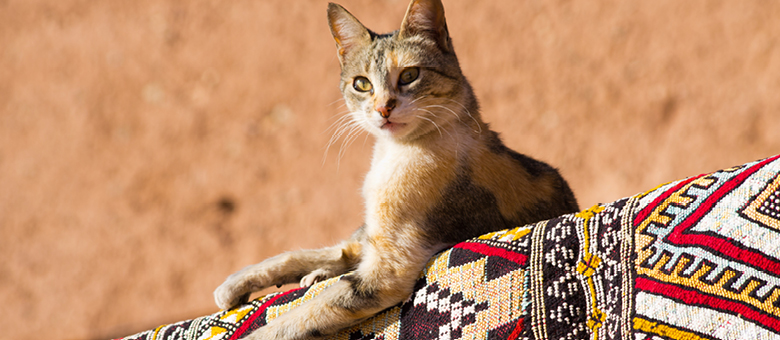
The love story between humans and cats really only starts with man’s sedentary lifestyle, the advent of agriculture and, in particular, the ability to store food. You can imagine that, as soon as humans began storing grain, rodents appeared. They not only ate a significant portion of the food reserves, but also contaminated them. Rats, moles and mice were responsible for more than 50% of food and grain storage losses. You can see how that would considerably slow the development of a population, which would choose to have fewer children to ensure enough food for everyone.
All-you-can-eat buffet for cats
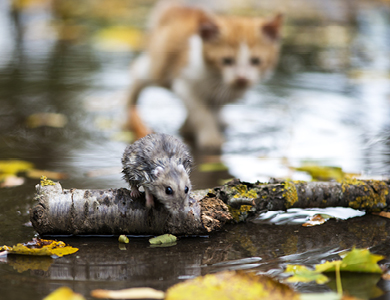
That’s where cats came into the picture. Although they weren’t interested in the grain reserves, the vermin in these reserves were extremely attractive to cats. The grain reserves therefore became an all-you-can-eat buffet for cats, which inadvertently helped humans by eliminating the vermin and protecting the supplies. Humans quickly understood this relationship and tried to keep as many cats around as possible by caring for and feeding them. Obviously, the fact that cats are beautiful animals worked in their favour and led to the first instances of cat domestication.
This is the first evidence that, without cats, humans would be centuries behind in terms of development. If not for these guardians of food reserves, there would not have been enough food for our population to thrive. In fact, this population expansion made technological development possible. I still have to tell you the story about cats and electricity. First, let’s go back to the Middle Ages and the Renaissance.
Cats as satanic creatures
I’ll skip over Egypt, since you know how the Egyptians worshipped cats. However, you might be surprised to learn that several historians and anthropologists are beginning to cast doubt on this adulation, describing instead the exploitation of cats for religious purposes. In fact, it’s because of this religious cult that cats would experience centuries, even millennia, of suffering. Emperor Theodosius I was the unknowing instigator of this hardship in the middle of second century. In his fight against Paganism, he forbade all cults that were not Christian, including Bastet’s cult, which is represented by the famous statue of a woman with a cat’s head that you have undoubtedly seen around.
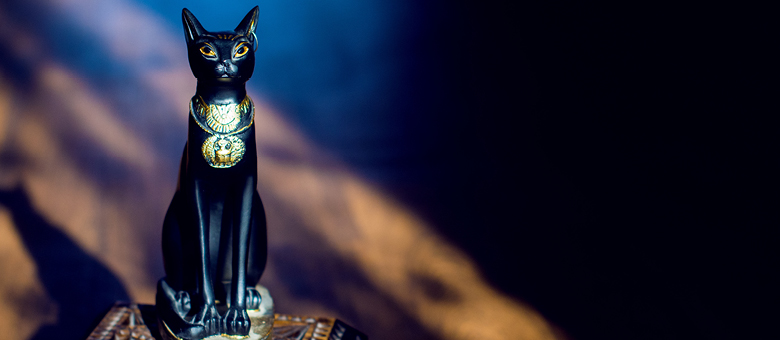
From that moment on, the Catholic Church in particular began to associate cats with all things bad, so much so that, 1,000 years later, Pope Gregory IX published Vox in Rama in 1233. This collection of rules and assertions was largely influenced by what his inquisitors, who were hoping to be seen as effective in their work, brought back to the Pope. They drew inspiration from Egyptian deities, creatures with animal heads, and the relationship that Theodosius I established by prohibiting Paganism, and therefore Bastet’s cult, to create stories about Satanic seances where creatures with cat heads—incarnations of the devil himself—appeared. Many cats were burned at the stake along with their disciples, otherwise known as witches. Much like today, it wasn’t unusual for widows to feed and care for cats. The widows were accused of helping and feeding creatures of Satan. That’s where the iconic Halloween images of witches and black cats come from. The story of witches has its own origins and doesn’t stem from that of the cat inquisitors, although it did play a role.
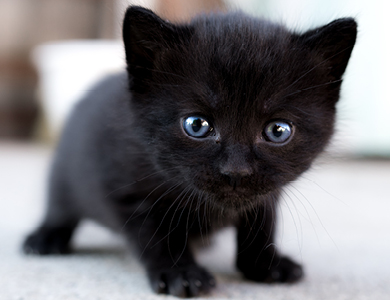
The fate of cats, especially black cats, still resonates today, 1,000 years later. In fact, most of the superstitions related to cats date back to that era. I could write an entire article on the origins of all the myths surrounding cats and about how there are seven times as many black cats euthanized in shelters today because of the myths related to that famous Vox in Rama. Of course, the plague didn’t help people’s negative perception of cats. Cats were wrongly accused of spreading the disease until King Charles realized that the cities that were most affected were those in which there were more cats because they followed rats, which were really the ones responsible for spreading the disease, but were never seen.
The nobility to the rescue
Starting in the Renaissance, cats regained popularity thanks to the aristocracy. Marie-Antoinette and King Louis featured their cats in several paintings, and anyone who wanted to be fashionable got a cat.
At the same time, the colonization of the new continent also helped improve the reputation of cats, which found work protecting food supplies by controlling vermin on colonizing ships and in the ports of New World cities. Cats were then used to hunt vermin in breweries, taverns, general stores, distilleries and farms, and continued to do so until very recently.
Let’s not forget the Industrial Revolution and the two world wars, where cats played a major role. They hunted vermin on warships and often became the crew’s mascot. Such is the case for Blackie, who became one of the most famous cats in the world after being filmed and photographed by the press being petted by Winston Churchill himself on a ship, during a historic meeting with President Roosevelt.
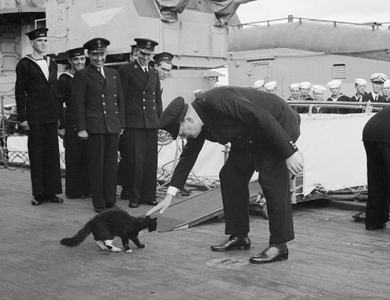
Cats and electricity
Now, let’s look at the second piece of evidence that cats are responsible for the advent of electricity, and the discovery of radio waves, radio (no, it wasn’t Marconi) and today’s technological level. Nikola Tesla is credited with inventing electricity. In his memoirs, he recounts how his interest in electricity came about. When he was quite young, while stroking his cat Macak, he saw a series of crackling sparks between his fingers and the cat’s fur. He was intrigued and wanted to know more about what caused it. The rest is history. Tesla invented the first alternating current (AC) motor, which remains one of the most important inventions in modern history, since almost everything that runs on energy today is based on this invention. He also discovered radio waves, based on which Wi-Fi and the Internet were invented.
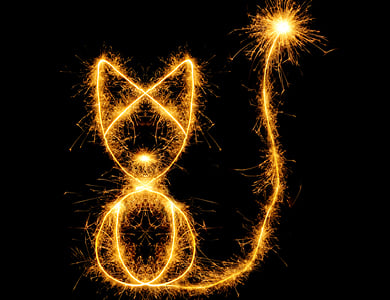
It’s all thanks to Tesla’s cat Macak! OK, you’re probably thinking that if Tesla hadn’t been inspired by his cat and made the discovery, someone else would have. That’s possible. But how long would it have taken? The fact is that we were able to develop more quickly as a society in part because cats protected our grain supplies at the beginning of our civilization, on our farms and on the ships that would help found other civilizations. So, remember to thank your cat for allowing you to read this article on your laptop, using Wi-Fi, because without your cat, you might not even be here!


